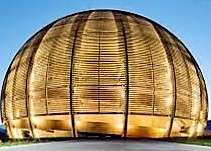Speaker
Description
The neutron activation method is well-suited to investigate neutron-capture
cross sections relevant for the main s-process component. Neutrons can be pro-
duced via the $^7$Li(p,n) reaction with proton energies of 1912 keV at e.g. Van de
Graaf accelerators, which results in a Maxwellian spectrum of neutrons corre-
sponding to a temperature of k$_\text{B}$T = 25 keV. This mimicks the s-process scenario
in low-mass asymptotic giant branch (AGB) stars. However, the weak s-process
takes place in massive stars at temperatures between 25 and 90 keV. Neutron
spectra corresponding to a Maxwell-Boltzmann distribution with k$_\text{B}$T > 25 keV
cannot be produced by the $^7$Li(p,n) reaction. Simulations using the PINO [1]
code suggest that a Maxwellian spectrum for higher energies can be produced
by a linear combination of different neutron spectra. The resulting spectrum
averaged cross sections can be combined to e.g. k$_\text{B}$T = 90 keV Maxwellian Av-
eraged Cross Section (MACS). To validate the PINO code at proton energies
E$_{\text{p}}$ $\neq$ 1912 keV, measurements were carried out at the PTB Ion Accelerator
Facility (PIAF) at the Physikalisch-Technische Bundesanstalt in Braunschweig,
Germany. The neutron fields were measured using a pulsed proton beam and
three 6Li-glass scintillation detectors mounted at different angles. The neutron
energy was determined by time-of-flight (TOF).
[1] R. Reifarth et. al., Nuclear Instruments and Methods in Physics Research
A 608, 139 (2009)




